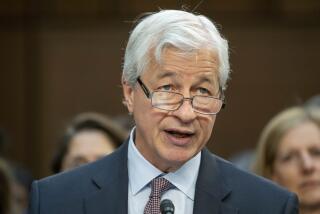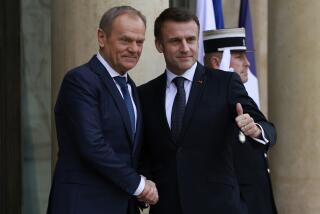Jacob Lew again prods European leaders to promote economic growth
WASHINGTON -- As the new U.S. Treasury secretary, Jacob J. Lew is taking up a familiar and so-far thankless task: trying to persuade top European officials to shift from austerity to more growth-oriented economic policies.
That was a major focus of Lew’s first swing through Europe last week as Treasury head, and on Wednesday in Washington, he again pushed the message, albeit gingerly.
In a speech, Lew contrasted the divergent post-recession fortunes of the U.S. and Europe, noting that the American economy had grown for 14 straight quarters and added millions of jobs, while the Eurozone’s output had fallen over the last five quarters and some of its member countries are battling extremely high unemployment.
Lew’s point: The Euro area’s fiscal belt-tightening policies aren’t working -- and that’s bad for everybody.
“Stronger demand in Europe is critical to global growth,” he said in prepared remarks delivered at Johns Hopkins University’s School of Advanced International Studies.
Lew spoke to students, faculty and guests at the university, but his audience might as well have been the European and other global finance officials in town this week for the spring meetings of the International Monetary Fund and the World Bank.
How fiscal debt reduction affects economic output -- and what’s the right balance between managing debt and promoting growth -- have been central topics of discussion during the meetings.
In his remarks, Lew suggested that America’s sustained recovery from recession, unlike the Eurozone’s, was the result of having “navigated a careful balance between providing support to the private sector while undertaking deficit reduction at a measured pace.”
The U.S. recovery, of course, has been uneven and weak. And many would not agree that the U.S. is a model for prudent fiscal policymaking.
Indeed, at about the same time that Lew was speaking Wednesday, the IMF’s managing director, Christine Lagarde, had some pointed words about Washington’s own fiscal spending cuts and higher taxes that, when all added up, she said, would shave 1.8% from growth.
“We think it’s too much, too fast,” she said during a forum.
Lew also talked Wednesday about the need to rebalance global demand, saying that the U.S. can’t be the consumer of last resort for the world’s goods. He said China had made progress on reducing its large current account surplus, but said it needed to further appreciate its currency.
Lew, however, made no mention in his speech of Japan’s currency, which has fallen sharply in recent months and is expected to be a key issue when officials representing the Group of 20 nations, who are in town as well, meet on the sidelines of the IMF and World Bank gatherings.
ALSO:
Jobs report paints a dreary picture
G-20 seeks to allay fear of currency war
IMF lowers global growth forecast, warns of risks to economic recovery







